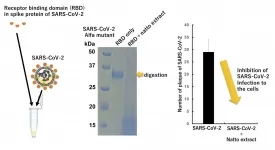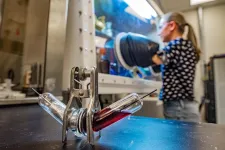Long thought to contribute to longer, healthier lives across Japan -- the country with the longest life expectancy on Earth and home to more than a quarter of the world's population aged 65 years or older -- natto was previously found to be a diet staple in those who were least likely to die from stroke or cardiac disease. Now, researchers have found that extract made from the sticky, strong smelling natto may inhibit the ability of the virus that causes COVID-19 to infect cells.
The team published its results on July 13th in Biochemical and Biophysical Research Communications.
"Traditionally, Japanese people have assumed that natto is beneficial for their health," said paper author Tetsuya Mizutani, director of the Center for Infectious Disease Epidemiology and Prevention Research at the Tokyo University of Agriculture and Technology (CEPiR-TUAT). "In recent years, research studies have revealed scientific evidence for this belief. In this study, we investigated natto's antiviral effects on SARS-CoV-2, the virus that causes COVID-19, and bovine herpesvirus 1 (BHV-1), which causes respiratory disease in cattle."
Natto is made by fermenting soybeans with Bacillus subtilis, a bacteria found in plant and in soil. The researchers prepared two natto extracts from the food, one with heat and one without. They applied the extracts to sets of lab-cultured cells from cattle and from humans. One set was infected with SARS-CoV-2, while the other set was infected with BHV-1.
When treated with the natto extract made without heat, both SARS-CoV-2 and BHV-1 lost the ability to infect cells. However, neither virus appeared to be affected by the heat-treated natto extract.
"We found what appears to be a protease or proteases -- proteins that metabolize other proteins -- in the natto extract directly digests the receptor binding domain on the spike protein in SARS-CoV-2," Mizutani said, noting that the protease appears to break down in heat, losing the ability to digest proteins and letting the virus remain infectious.
The spike protein sits on the virus's surface and binds to a receptor on host cells. With an inactive spike protein, SARS-CoV-2 cannot infect healthy cells. The researchers found a similar effect on BHV-1.
"We also confirmed that the natto extract has the same digestive effects on the receptor binding domain proteins of the SARS-CoV-2 mutated strains, such as the Alpha variant," Mizutani said.
While the results are promising, Mizutani said, he also cautioned that further studies are needed to identify the exact molecular mechanisms at work. He also stressed that the research does not provide any evidence of reduced viral infection simply by eating natto. Once the components are identified and their functions verified, the researchers plan to advance their work to clinical studies in animal models.
"Although there are vaccines for COVID-19, we do not know how they effective they may be against every variant," Mizutani said. "It will also take time to vaccinate everyone, and there are still reports of breakthrough cases, so we need to make treatments for those who develop COVID-19. This work may offer a big hint for such pharmaceutical design."
INFORMATION:
Mizutani is also a professor in the Graduate School of Agriculture Cooperative Division of Veterinary Science, TUAT. Other contributors include Mami Oba, Wen Rongduo, Tomoko Yokota, Junko Yasuoka, Yoko Sato and Hitoshi Wake, CEPiR-TUAT; Akatsuki Saito and Tamaki Okabayashi, Department of Veterinary Science and Center for Animal Disease Control, Faculty of Agriculture, University of Miyazaki; Koji Nishifuji, Laboratory of Veterinary Internal Medicine, Faculty of Agriculture, TUAT; and Yutaka Nibu, The University Research Administration Center, TUAT. Rongduo is also affiliated with Graduate School of Agriculture Cooperative Division of Veterinary Science, TUAT; and Wake is also affiliated with the National Institute of Technology (KOSEN).
Takano Foods Co., Ltd. Supported this research.
Original publication:
Mami Oba, Wen Rongduo, Akatsuki Saito, Tamaki Okabayashi, Tomoko Yokota, Junko Yasuoka, Yoko Sato, Koji Nishifuji, Hitoshi Wake, Yutaka Nibu, Tetsuya Mizutani.
Natto extract, a Japanese fermented soybean food, directly inhibits viral infections including SARS-CoV-2 in vitro.
Biochemical and Biophysical Research Communications, Volume 570, Pages 21-25, 2021.
https://doi.org/10.1016/j.bbrc.2021.07.034.
About Tokyo University of Agriculture and Technology (TUAT):
TUAT is a distinguished university in Japan dedicated to science and technology. TUAT focuses on agriculture and engineering that form the foundation of industry, and promotes education and research fields that incorporate them. Boasting a history of over 140 years since our founding in 1874, TUAT continues to boldly take on new challenges and steadily promote fields. With high ethics, TUAT fulfills social responsibility in the capacity of transmitting science and technology information towards the construction of a sustainable society where both human beings and nature can thrive in a symbiotic relationship. For more information, please visit http://www.tuat.ac.jp/en/.
About Center for Infectious Disease Epidemiology and Prevention Research at TUAT (CEPiR-TUAT):
On April 1, 2021, the "Center for Infectious Disease Epidemiology and Prevention Research (CEPiR)" was established through the reorganization of the previous institution, "Research and Education Center for Prevention of Global Infectious Diseases of Animals." The outbreak of foot-and-mouth disease in Miyazaki Prefecture in 2010 led to the establishment of centers for research and education on infectious diseases of animals at veterinary universities across Japan. Our center was one of them. We have been conducting research on all types of organisms, including mammals, birds, reptiles, fish, insects, plants, and mucus, with a focus on infectious diseases of domestic animals. During this time, we have reported more than 40 "novel virus" papers, accounting for 0.1% of the world's novel virus discovery papers. We have also developed a method for the comprehensive detection of infectious diseases in cattle, pigs, chickens, dogs, and cats, which is being used by universities and other institutions in Japan and abroad. In the summer of 2019, as we approach a decade-long milestone, we have decided that it is "time to shed our skin. What is required of research on infectious diseases now? It was also the time when the second wave of the new coronavirus was hitting Japan. What is needed now is research that looks to the future. It is important to study infectious diseases that have already developed, but we should also study infectious diseases that will develop in the future. Originally, TUAT had a culture of establishing a new discipline called "Epidemiology and Prevention" and making it useful to the world. "Epidemiology and Prevention" is an academic discipline that predicts infectious diseases that will emerge in the future so that countermeasures against infectious diseases that have been taken in the past can be conducted ahead of time. Moreover, in April 2021, we are reborn as the "Center for Infectious Disease Epidemiology and Prevention Research (CEPiR)". This is where our new challenge begins. Our goal is to be recognized worldwide as a center for disseminating information on unknown viruses in the next decade. We will continue to predict the next infectious disease of the new coronavirus and disseminate information on countermeasures.
Contact:
Tetsuya Mizutani, DVM, PhD.
Director, Professor,
Center for Infectious Disease Epidemiology and Prevention Research,
Tokyo University of Agriculture and Technology (CEPiR-TUAT)
tmizutan@cc.tuat.ac.jp
https://tuat-cepir.jp/en/




